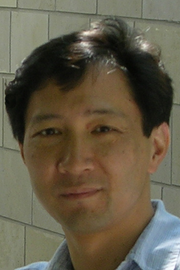
The aim of Dr. Chow’s laboratory is to advance our understanding of how hormone and neuronal secretion is controlled in normal and pathological states. In the last decade, neuroscience has benefited tremendously from the molecular biology revolution. Dozens of synaptic proteins have been cloned. One of the most exciting goals today is to figure out how these proteins orchestrate the complex life cycle of the secretory vesicle. It is of particular interest to understand how calcium is involved. Katz and colleagues showed that calcium triggers fast exocytosis. More recently it has become clear that calcium may play other important roles that precede exocytosis, perhaps facilitating translocation, docking and priming of vesicles.
One preparation Dr. Chow’s lab works with is adrenal chromaffin cells. These neuroendocrine cells, like neurons, fire action potentials, exhibit fast calcium-dependent exocytosis, and express synaptic proteins or closely related proteins. They have the advantages of being easy to prepare, and their secretory vesicles are larger than synaptic vesicles and can therefore be visualized more readily. We use viral vectors to express the protein of interest in native or mutated form, and we then study the effects on secretion. The high-resolution methods we use to monitor exocytosis include membrane capacitance measurements, carbon-fiber amperometry, and total internal reflection fluorescence microscopy (also called evanescent-wave microscopy).
Another related area of interest of the laboratory is the cellular mechanism of abnormal secretion and cell death in diabetes mellitus. In collaboration with Prof. Richard Bergman, the Lab is studying insulin secretion from healthy and diseased pancreatic beta cells. The aim is to understand the nature of derangements in beta cell function early in disease, which may permit design of therapeutic interventions early in the development of type I and II diabetes.
http://www.usc.edu/programs/neuroscience/faculty/profile.php?fid=8